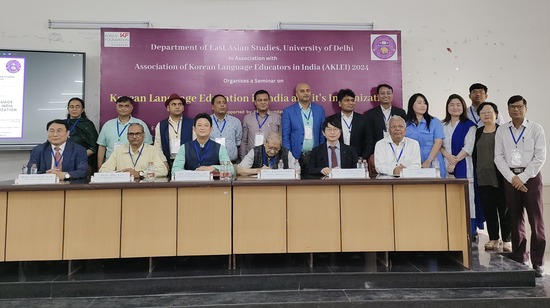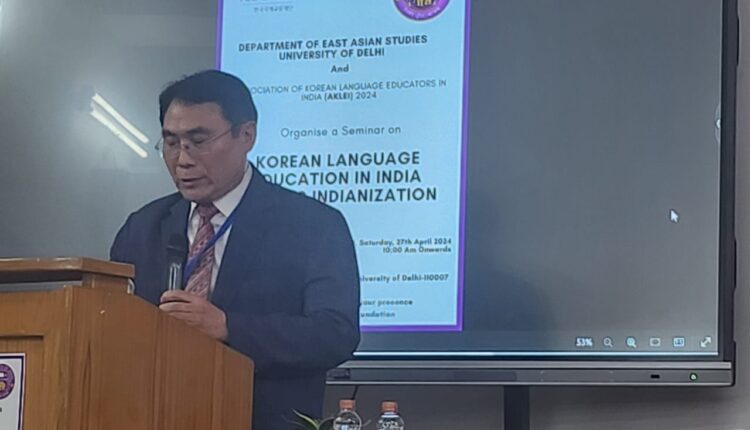Indianise Korean learning process to aid aspirants: Korean Language Experts
ACN EXCLUSIVE: The approach emphasizes the nativization of Korean language education, utilizing Indian traditional texts and linguistic schema to expedite learning.
NEW DELHI: In a ground-breaking move, experts in Korean linguistics are dedicatedly working towards making the Korean language more accessible to Indian learners by incorporating Indian elements into its learning process.
The initiative, led by the Association of Korean Language Education in India (AKLEI), focuses on Indianizing the teaching methods of Korean, aiming to simplify the learning process for Indian learners. This involves integrating Korean and Indian words, adapting sentence structures, and exploring the phonetic similarities between Korean and Hindi consonants to aid pronunciation.
Interestingly enough, sentence formation of the Indian languages such as Hindi and others is similar to that of Korean. The subject of the sentence comes first, the objects come second, and the verb come last in Korean and Hindi language. It is not the case in English sentence making.
The subject came to the fore during the AKLEI 2024 Seminar on Korean Language Education in India and its Indianization organized on April 26-27 at, Faculty of Arts, University of Delhi, where experts from S Korea and Indian put their heads together to delve more into the subject.

Led by its chairman Dr. KIM Do Young, Honorary Director, JMI University, AKLEI’s approach emphasizes the nativization of Korean language education, utilizing Indian traditional texts and linguistic schema to expedite learning. Additionally, efforts are underway to minimize the reliance on Hanjaeo characters and maximize vocabulary through transliteration methods like Rai Shauer.
One of the key objectives is to establish a standardized Korean literacy framework tailored to Indian learners, addressing linguistic nuances and enhancing usability. While there are numerous comparative linguistic features between Korean and Indian languages, further research and application are deemed essential to refine and expand upon this distinctive approach to Korean language education in India.
“We’ll have to build up Standard Korean Literation for the learners. etc. There are numerous comparative linguistic features and usability in Korean language education in India. This distinctiveness should be studied more delicately, and more research and application is needed,” said Dr. KIM.
He added, “I guess, more institutes will be offering Korean language courses in near future, accordingly, we need more research and adaptation for effective education. At this occasion, Korean language educators should share their linguistic findings and more effective way of education. I believe today, and tomorrow, we may share all academic queries and share better directions for the next generations.”
Sang Woo Lim, the Deputy Chief of Mission from the Embassy of the Republic of Korea, and Hyunsoo Choi, Director of the Korea Foundation, Seoul, Prof. Padma Bhushan Awardee Kapil Kapoor, a retired luminary from JNU, Prof. Anil Rai, Dean of International Relations, DU, Prof. Panda, Head, East Asian Studies, DU, and Dr. KIM young-soon, Head, Korean Studies, DU were also present on the occasion.
While setting the context of his speech Dr. KIM earlier said that the Korean language education in India had been developed for the past five decades. It has been assorted and established with area studies and language programs at Jawaharlal Nehru University since 1973. Coming to the 21st century, the number of institutes for Korean language increased noticeably; the front runner is University of Delhi, which began its post graduate diploma course in 2002, and in 2023 it offered M.A. in Korean language. For celebrating its opening MA, we are holding this seminar in Delhi University.
He said Jamia Millia Islamia opened its B.A in Korean in 2019, M.A.in 2022, and going to open Ph.D this year. English and Foreign Language University, Manipur University, Central University of Jharkhand offering B.A and M.A. in Korean according to New Education Policy. Now more than 20 odds universities offer the various Korean language programmes ; certificate, diploma, B.A. , M.A. and Ph.D.
“In 2007, A need for academic platform was increased and consequently it organized the All India Korean Language Seminar in 2007, with scholarly comprehension and sharing empirical data with one another. This organization published three volumes of Korean language education in India; Tasks and Strategy of Korean Language Education in India (2015), Methodology of Korean Language Education(2016), Korean Language Education in India; Its Issues and Strategy (2017) . This year, we are going to publish the selected papers in an UGC care list journal,” he added.
Dr. Kaushal Kumar, Dr. Satyanshu Srivastava, Prof. Anna Yang, Dr. Paresh Kumar, Prof. Kim Young Soon, Dr. Shashi Kumar Mishra, Ahanthem Romita Devi, Manish Kumar Barnwal, Manish Kumar, Dr. Hema, Ravi Kumar Ranjan, Langkhankhup Ngaithe, Naushad Alam, Myung E Lee, Mukesh Kumar Jaiswal, Rahul Kumar, and K H Roopa


